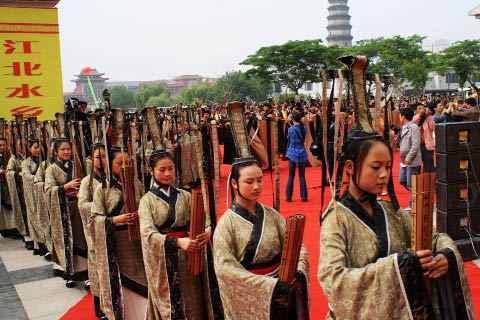| Mozi: No Aggression, But Universal Love
By WEN HAIMING
MOZI (ca. 475-395 BC) was one of many philosophers in the volatile Pre-Qin Period (before BC 221 when the State of Qin annexed other six kingdoms and unified China) who were committed to restoring and overhauling the social order.
Mozi was a commoner born in the State of Lü (in today’s Shandong Province), but spent most of his life in the State of Song (in present day Henan Province). He studied Confucian theory in his early years, and later established his own school of thought Mohism, which challenges Confucianism on many fronts. Mozi traveled around the states to sell his political ideas to the rulers, who gave him the cold shoulder however. This great thinker never held any high official position in his lifetime.
Still Mohism was as influential as its rival Confucianism in the Pre-Qin Period. Mozi brought forth a system of political and social philosophy. It was his followers that compiled his work into a book named after him, but which actually also incorporates the cream of Mohist thinking developed by later generations. Mozi has sections that focus on the study of logic, which exemplify the analytical mind of ancient Chinese philosophers. When Chinese philosophy became part of a dialogue with the West in modern times, the long forgotten Mohist logic was rediscovered to support the assertion that Chinese philosophies demonstrated an analytical mindset at the very outset.
 |
| A memorial ceremony for Mozi held in his birthplace, Tengzhou of Shandong Province. China Foto Press |
Opposition to Warfare and Advocacy of Universal Love
Mozi, like Da Vinci, was versatile. Besides his achievements in philosophy, he was, in his day, a great scientist. It was said that he invented many weapons and machines, including a wooden bird that could fly. In contrast to the inherent nobility of Confucianism, Mohism has the common touch, and is tinged with idealism. Mozi denied the rationalization of war completely, and “no aggression” is the cardinal principle of his political stance. The work that remains recounts the story of a great thinker who was also a doer; on hearing that the State of Chu was planning an attack on Song, he walked for ten days and nights to Chu to persuade its rulers to change their mind. He argued wars were meant to destroy the physical existence of individuals, and if people respected others’ lives as much as their own, they would never go to war.
The principle of “universal love” (jian’ai) is the premise for Mozi’s condemnation of war. Indiscriminate and unconditional love is that which is extended universally, in other words regardless of the personal relationship entailed. Mozi said that it benefits the lover and the loved, and the failure to love universally causes social turmoil. Such tolerance, Mozi said, is possible if people see others’ homelands, families and lives as their own. Mozi’s idea is close to that of Christian doctrine, which teaches that all God’s creatures are equal.
Unfortunately, the beneficence Mozi professed is often tagged as an ancient form of utilitarianism because he made the point that people should help each other on the grounds that they would eventually be aided themselves. To make him sound even more utilitarian, Mozi stressed that his doctrine brought the greatest gains to the largest number of people. In a period haunted by fierce strife between states and peoples and the deep hostility that prevailed, a spirit of altruism inspired reconciliation and unity. Urging people to reach beyond hierarchical and geographical divisions to tap the milk of human kindness, this notion is still relevant today, stoking our desire to turn an imperfect world into a better place.
Mozi believed in the will of heaven. He thought heaven possessed a will and disposition, and the rulers on earth were its sons. Heaven could reward or punish humans for their performance, so rulers ought to be cautious in handling their duties. Mozi claimed that it was heaven’s desire that mankind love and help each other, and that all should comply with this principle. Transgressors would be punished by the gods and ghosts sent down by heaven to dispense justice. The existence of immortal beings was also taken for granted, and they were regarded as wiser than human beings, including kings. Mozi’s intention to provoke awe for divine forces reflects a defiance for the prevailing ruling class and compassion and concern for the common people.
|
